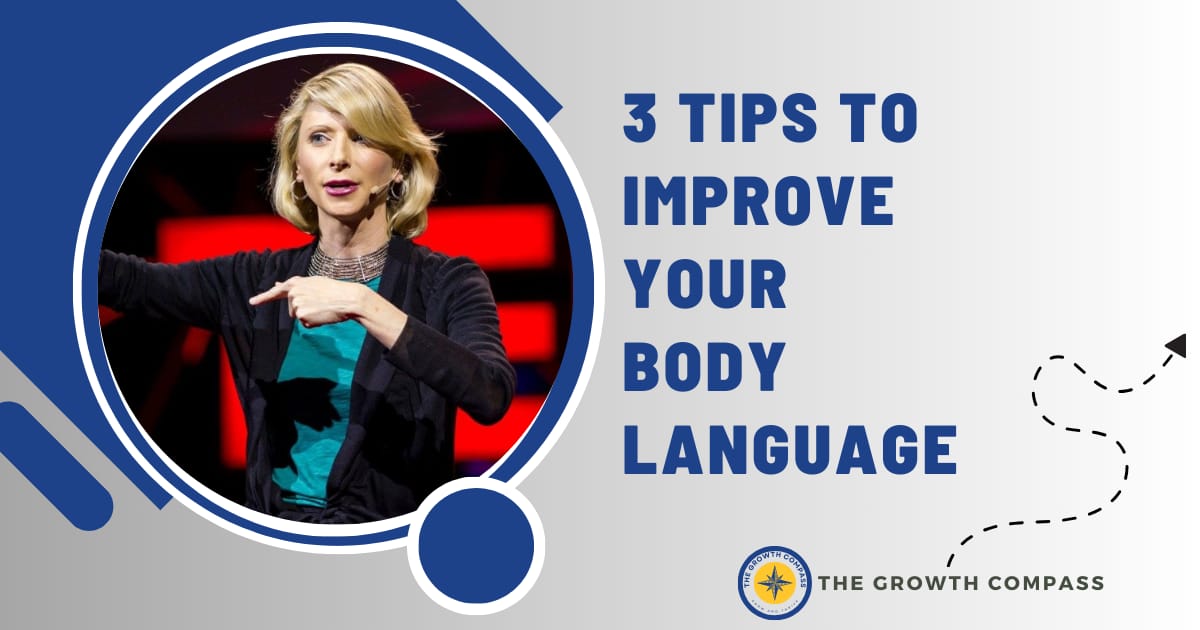
Good Day, and welcome to The Growth Compass!
⚠Reminder: We have given all subscribers access to our FREE Growth Compass Library that you can access HERE.

Here’s Where We Are Headed Today:
Amy Cuddy on Mindset
Your Body Language May Shape Who You Are
Great Posts of the Week
Free Mental Fitness Links 👇
Amy Cuddy on Mindset
"Preparation is obviously important, but at some point, you must stop preparing content and start preparing mindset. You have to shift from what you’ll say to how you’ll say it.” - Amy Cuddy

Your Body Language May Shape Who You Are
Today, we are going to talk a look at Amy Cuddy’s TEDx Talk, Your body language may shape who you are, which has over 25 million views. She reviews the profound impact that nonverbal behavior can have on our thoughts, feelings, and life outcomes.
She states the premise of the speech in one sentence: “We are also influenced by our nonverbals, our thoughts, feelings, and physiology.”
Why body language matters:
Your body language affects yourself and it affects others - She says, “Nalini Ambady, a researcher at Tufts University, shows that when people watch 30-second soundless clips of real physician-patient interactions, their judgments of the physician's niceness predict whether or not that physician will be sued. It doesn't have to do so much with whether or not that physician was incompetent, but whether we like that person and how they interacted.”
Your body language can make you more confident and effective - Amy poses the question: “We know that our minds change our bodies, but is it also true that our bodies change our minds?” She notes that powerful people tend to be more assertive, confident, and optimistic. They feel they are going to win even at games of chance and can think more abstractly.
So they ran a study and here is what they found:
She said, “We brought people into the lab and had them do either high or low power poses before a very stressful job interview. The high-power posers were rated much more positively overall. It wasn't about the content of the speech but the presence they brought to the speech. They brought their true selves, their ideas, without any residue.”
That’s great, I know body language is important but what can I take away from this and how can I implement it?
Fake it until you become it - Cuddy emphasizes that you should embody the qualities you aspire to have, even if you don't feel them yet. It is practicing who you are becoming in the process. By consistently acting confident and powerful, these traits will eventually become a natural part of who you are. Implement this by practicing confident behaviors daily, such as maintaining strong eye contact, standing tall, and speaking assertively.
Tiny tweaks can lead to big changes - Small adjustments in your nonverbal behavior can significantly impact your mindset and outcomes. Cuddy's research shows that even a two-minute change in posture can alter hormone levels and boost confidence. Focus on making minor changes like improving your posture, smiling more, and using open body language in your everyday interactions.
Try a few power poses before you have a big activity - Before entering a stressful or evaluative situation, take two minutes to get your body into action. It means trying a power pose such as standing with your hands on your hips or stretching your arms out wide or getting your heart rate moving. This practice can increase your feelings of power and reduce stress, helping you perform better. Implement this by setting aside a few minutes before meetings, presentations, or interviews to practice power posing in a private space.
What should we take from this?
Mood follows action - The way you carry yourself directly impacts your mindset. It’s a reminder that sometimes, you have to act the way you want to feel.
You have to coach body language of your children, students, and team (see video below) - Observe and reflect on both your own and others' nonverbal cues. It can offer valuable insights into communication dynamics and knowing where people are mentally.
Ask yourself 3 questions about your body language to better reflect on where you can improve - Preparation isn’t just mental—it’s physical too. Reflect on how you’re using your body language to set the tone. What should my body language look like during the 3 phases of any task?
Anticipation Phase - What will my body language look like before the task? What do I think about?
Action Phase - What does it look like during the task?
Reinforcement Phase - What does it look like after? What emotions and thoughts am I choosing to reinforce whether I succeeded or failed?
@coachgrantcaraway ALL QBs NEED TO WATCH THIS #football #foryou #fyp
Great Posts from the Week
Free Mental Fitness Links 👇
That's a wrap for today. If you want to spread the joy, make sure to refer the newsletter to someone you think would benefit!
What topic would you like to see in future newsletters?
What I am reading and listening to:
Want More?
Feel free to view all of our FREE resources online here and our growing content library!
Interesting in advertising? Fill out this survey and we’ll get back to you soon!

